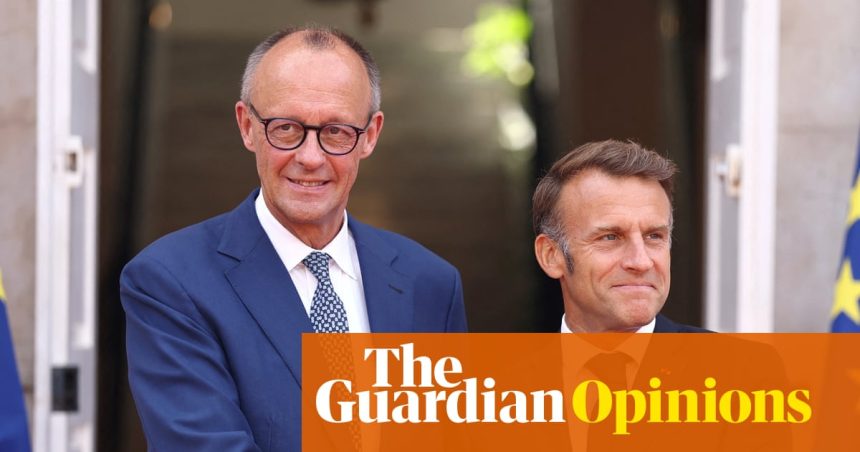Emmanuel Macron sounded like a man in grief. Not angry, not defiant, just a little triste. Europe, he lamented, was suffering a “degeneration of democracy”. Many threats emanated from outside, from Russia, from China, from powerful US tech companies and social-media entrepreneurs, France’s president said. “But we should not be naive. On the inside we are turning on ourselves. We doubt our own democracy … We see everywhere that something is happening to our democratic fabric. Democratic debate is turning into a debate of hatred.”
Squeezed between vituperative extremes of right and left, Macron knows of what he speaks. But “ungovernable” France is not alone in its bitter, intractable divisions. Across Europe, in the UK and the US, distrust and grievance daily deepen political dysfunction and social discord. Macron’s words apply, in fact, to almost any country espousing democratic principles. Belief that democracy is the form of governance best suited to the modern world is dwindling, especially among younger people. Meanwhile, the public space grows coarser and more violent. Macron was speaking at an event marking the 35th anniversary of Germany’s 1990 reunification, a moment of great optimism. Yet, like France, today’s polarised Germany faces an acute crisis of political faith.
Just look around. In elections last weekend, the Czech Republic followed Poland, Austria and other EU states in lurching towards the populist hard right, swept along on a rising tide of anti-establishment negativity. Support for opportunistic bigots who feed on fear, resentment and loss – while lacking credible policies on complex issues such as migration – is not an endorsement of democracy but its despoliation. This ugly rush to extremes is a vote of no confidence in the democratic system itself, exacerbated by reduced levels of participation and turnout among disadvantaged social groups.
In all these countries, a national democratic consensus is woefully lacking. In declining, despairing Britain, where national flags are worn like comfort blankets, both leading mainstream parties are flailing; yet the alternatives are implausible or downright pernicious. In the US, the “home of democracy”, effective opposition to Republican one-party rule has all but collapsed, at least at national level. Striving to gerrymander congressional districts, Donald Trump increasingly resembles a dictator.
Lack of genuine democratic choice and economic opportunity, fuelling alienation and revolt, beset countries as diverse as Morocco, Kenya and Bangladesh, all of which have witnessed recent upheavals. In the Philippines, Nigeria, Turkey, Indonesia and Madagascar, corruption and abuse of power have triggered anti-government protests. In Nepal last month, young people powered a “gen-Z revolution”. All these countries, in Europe and beyond, are different – except in one vital respect. Compared with authoritarian regimes such as China and Russia, their societies remain relatively open and free, for now.
This is the fundamental challenge each faces: democracy isn’t working, or it is working so badly it risks being jettisoned. The once exemplary US – a paradigm lost – and fractious western Europe are faltering. And once again, less established democracies in the global south, and in central and eastern Europe, are frontline states in a reviving cold war of influence and values fought against the Beijing-Moscow axis. Like Moldova and Georgia, to name two recent battlegrounds, they could go either way.
A crunch is coming. In its annual report, Freedom House, the US-based rights watchdog, found that violence, poll manipulation and repression marred more than 40% of national elections held in 2024. Global freedom, assessed in terms of political liberties and civil rights, declined for a 19th consecutive year. “Conflicts spread instability and thwarted democratic progress around the world,” the report concluded.
In the US, a recent survey found a record 64% of Americans believe their democracy “is too politically divided to solve the nation’s problems”. In the UK, a poll of people aged 16-29 found 63% think democracy is in trouble. While young people “preferred to live in a democracy over a dictatorship by 57% to 27%”, only 35% said they would consider getting involved in organised politics.
after newsletter promotion
If a sort of global anti-democracy revolt or, at least, a critical loss of faith in democratic systems is occurring, it would be useful to know why. Short- and long-term economic issues – the cost of living, inflation, lack of good jobs, de-industrialisation, shattered communities, institutional failures, wealth inequality, globalisation, mass migration linked to the climate crisis, the busted myth of infinitely sustainable growth – are all factors. Untrustworthy leaders, reflecting falling moral standards, is another. Insidious election meddling and online fakery by Russia and others hasten breakdown. Younger generations are pitted against ageing populations. And there is hopelessness, as well as anger, about the mess the world is in, environmentally and geopolitically.
For Andreas Reckwitz of Humboldt University of Berlin, all this discontent is rooted in an overall, profound and ubiquitous sense of loss. “Western modernity’s foundational lie” – the post-Enlightenment belief that human progress is constant and inevitable, that everything gets better over time, that life improves – has been brutally exploded by the experience of recent decades, Reckwitz argues. “Loss has become a pervasive condition of life … The question is no longer whether loss can be avoided but whether societies bound to ‘better’ or ‘more’ can learn to endure ‘less’ and ‘worse’.”
Seen this way, rejection of failing democratic structures and the advance of demagogic throwbacks pledging a return to “the way things were” are more easily understood. “If politics continues to promise endless improvement, it will fuel disillusionment and strengthen populisms that thrive on betrayed expectations,” Reckwitz writes. “Populism channels anger over what has disappeared but provides only illusions of recovery. The crucial question then becomes: how to deal with loss?”
Reckwitz has his own suggestions, involving resilience and redistribution. If anyone has a definitive answer, Macron, with much to lose, would surely love to hear it.

Leave a Reply